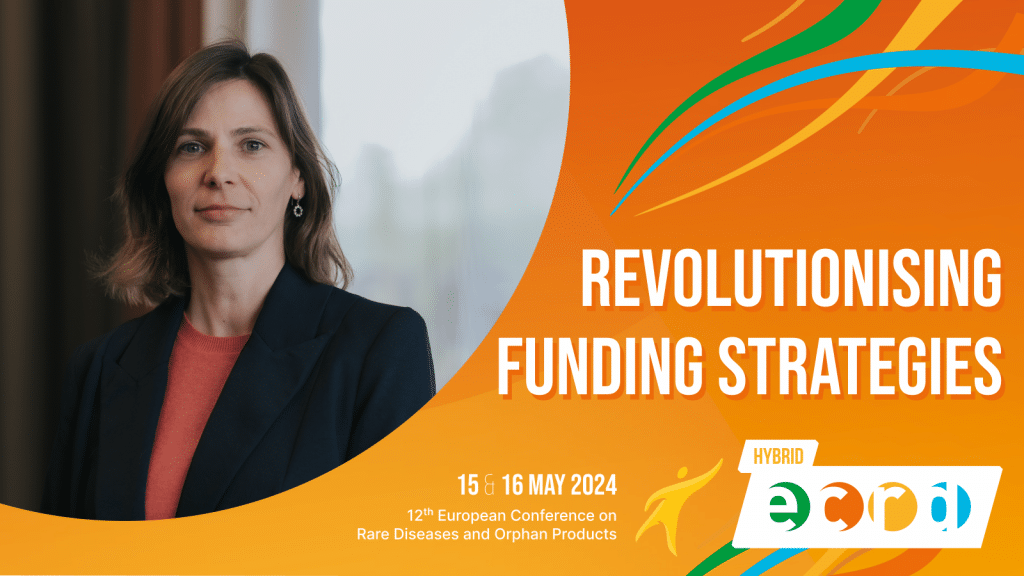Roseline Favresse: The Call to Revolutionise Funding for Rare Disease Research at ECRD 2024
February 2024Our unwavering commitment to revolutionising the funding landscape for rare disease research will be among the six key themes taking centre stage at our upcoming European Conference on Rare Diseases and Orphan Products (ECRD) 2024.

With ECRD 2024 scheduled for 15 and 16 May in Brussels and online, our session, Revolutionising Funding Strategies for Breakthrough Therapies in Rarer Diseases, will address this critical issue. This session will not only highlight best practices but also showcase examples of therapies developed through innovative funding mechanisms and business models. It will examine hybrid funding models bridging for-profit and not-for-profit approaches, assessing the ecosystem’s readiness for such innovative strategies.
The need for a revolution in the funding of rare disease research is indisputable. Imagine a world where every rare disease, no matter how uncommon, receives the attention and research it deserves. This vision, challenging to realise, is attainable through an innovative new approach to funding rare disease research.
Rare diseases collectively impact hundreds of millions of individuals globally. Despite their cumulative point prevalence, these conditions are alarmingly underrepresented in research funding. Traditional models, designed for more common diseases, inadequately address the unique challenges of rare diseases. Acknowledging that every rare disease patient deserves the same level of care and treatment opportunities as those with more prevalent illnesses is crucial.
Despite increasing collaboration in funding rare disease research in Europe, the funding landscape for rare diseases clinical research remains fragmented and lacks adequate resources. Only a small fraction of rare diseases has established therapies. Research often focuses on more prevalent rare conditions, leaving those with ultra-rare conditions in a precarious state. The distressing fact that 94% of rare diseases lack specific treatment highlights not just a medical concern but also a matter of equity and justice.
EURORDIS advocates for a patient-centric approach to research, where patients and their families are integral partners, providing invaluable insights. A collaborative framework in Europe, uniting patients, researchers, industry partners, and policymakers, is essential to fully harness this potential.
Public-private partnerships offer a promising strategy, merging private sector innovation with public sector commitment to public health. These collaborations must be designed carefully to meet the needs of rare disease patients, balancing market forces and patient welfare.
Innovative funding models are vital, supporting research from foundational science to clinical trials and treatment development. This includes developing novel business models to make research financially viable for small patient populations.
Accelerating Research through Collaboration
Data sharing is another key factor in boosting research funding. With 95% of rare disease patients willing to share their health data for research, a collaborative data management approach across Europe could expedite research, leading to breakthroughs that benefit the entire medical community. However, this requires a cultural shift towards openness and a regulatory framework supporting secure, ethical data sharing.
EU Member States must strategically invest in rare disease research teaming up with Industry stakeholders. Research initiatives must align with the specific needs and real-world circumstances of rare disease patients to ensure impactful outcomes.
As we envision the future, let’s aim for a research ecosystem that is adaptable, patient-focused, and equitable, where every rare disease has a path to research and treatment. The time to act is now, and the ECRD 2024 session is a pivotal step in this journey.
The 12th European Conference on Rare Diseases and Orphan Products (ECRD 2024) will be taking place on 15 and 16 May in Brussels and online.
With over 1,000 participants, the biennial Conference will present an unrivalled opportunity to network and exchange invaluable insights within the rare disease community. The discussions at ECRD 2024 will culminate in clear policy recommendations that can influence both EU and national policies.
By Roseline Favresse, Research Policy and Initiatives Director, EURORDIS-Rare Disease Europe
Disclaimer: As a Staff Blog, the opinions – including possible policy recommendations – expressed in this article are those of the author and do not necessarily represent the views or opinions of EURORDIS. The publication of this article on the EURORDIS website does not equate to endorsement.
